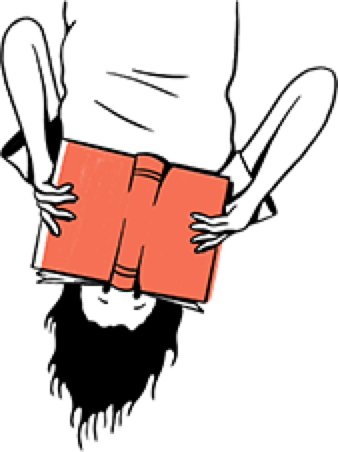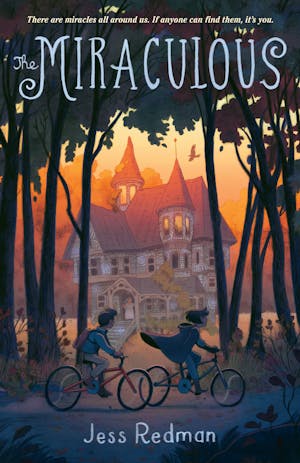Chapter 1
On the night before the funeral, Wunder Ellis stopped believing in miracles.
Before that, he had really and truly believed. In fact, he had been a miracologist.
He became a miracologist when he was five years old. It happened like this:
It was dusk, and he was walking with his mother and father through the woods on the edge of Branch Hill. He had been in the woods before—the woods full of sprawling oaks and knobbly kneed cypresses and Spanish moss that cascaded down branch after branch like so many gray-green waterfalls.
He had been in the woods before. But he had always stayed close to his parents.
That evening, full of after-dinner ice cream and end-of-the-day adventurousness, he ran ahead.
He ran down the path that was potholed and cracked, but paved nonetheless. Above him, a bird cawed out a sunset song.
Then he came to a particularly toweringly tall live oak. It was covered in brilliant green resurrection fern, and beside it there was a dirt trail.
From the path he could see that the trail led to a house, a house in the middle of the woods. He could still hear his parents not far behind him—his father’s voice low and slow, his mother’s faster and full of dips and rises. They were so close that he felt brave.
Brave enough to turn down the trail.
The house was like nothing Wunder had ever seen—a ramshackle, crumble-tumble collection of widow’s walks and towers and sagging porches and broken windows. It was made of a wood that looked black in the fading light.
Except for the grain of the wood, which was circular and so pale that it nearly glowed, covering the house in bright white spirals.
There was a sign hanging in the overgrown clearing in front of the house. Wunder couldn’t read yet, but he knew his letters, and he had found D, W, and H when he heard the bird from above cawing again.
The bird from above now cawing below.
Cawing very close to him.
Before he could duck, he felt something brush past the top of his head, soft, soft, feather soft, and then the bird was above him. A white shape soaring up to the peak of the very tallest tower.
And as the bird landed, the wood-grain spirals—from the top of the house to the bottom—began to turn. Slowly at first, then faster and faster until they were spinning so wildly that Wunder felt dizzy.
Spinning like thousands of clock hands. Spinning like thousands of tops set off at once.
Wunder had heard about miracles his entire life. He had been one, after all—the baby who should not have been born. But he had never seen one himself until right then.
And as he watched with wide blue eyes, he felt something lift off inside him. It was as if that bird hadn’t flown past him but instead had burst out of his own heart and was now fluttering through him, making his fingertips and the end of his nose tingle, muffling sound with its feathers. He was suddenly aware of how marvelous, how mysterious everything around him was, suddenly aware of how he was a part of that. He was filled, he knew, with a miracle feeling.
Then the bird cawed again.
The spinning stopped.
And up in that tallest tower, Wunder saw something move. A shadow in the window.
He turned and ran back down the trail.
“The house!” he cried. “Spinning! Someone’s in there!”
His parents were only a few feet ahead of where the dirt trail met the paved path. They listened as he told them what had happened.
“That’s the DoorWay House,” his father said. “But no one lives there.”
“It does look pretty magical though, doesn’t it?” his mother said, peering down the trail herself.
Wunder tried to explain again. His parents smiled and nodded some more. He could tell they didn’t really believe him.
But he knew what he had seen. He knew what he had felt. And more than anything, he realized, he wanted to have that feeling again.
The heart-bird feeling.
He wanted to find another miracle.
“I want to be a miracler,” he told his parents. “I mean, a miraclist. No, a mira … mirac…”
“Miracologist?” his father suggested.
“Miracologist,” Wunder said slowly, testing out the word. “Miracologist.” He nodded. “That’s it. I want to be a miracologist.”
His mother laughed and put her arm around him. “Well, of course you do.”
“I bet Father Robles knows all about miracles,” his father said. “We can talk to him on Sunday.”
“And I’ll help you learn about the not-church ones,” his mother said as they started back down the path in the fast-falling darkness. “There are miracles happening all the time, all around us. And if anyone can find them, it’s you, my Wunder.”
They bought him a journal the very next day—black leather with silver-edged pages and the title he had chosen stamped on the cover in white:
THE MIRACULOUS
As the years passed, Wunder filled The Miraculous with stories—his own and those he collected—with interviews of neighbors, with newspaper articles, with verses from holy books, with quotes from philosophers that he didn’t fully understand.
And with every page, Wunder was full of the feeling that the world was wonderful, the feeling that he was not alone, the feeling that he was not just himself—not just Wunder Ellis—but something else too.
Something lighter, something brighter, something lifted.
He was filled with the heart-bird feeling.
So yes, Wunder Ellis had believed in miracles. He had really and truly believed.
Until the night before the funeral.
Text copyright © 2019 Jessica Redman







